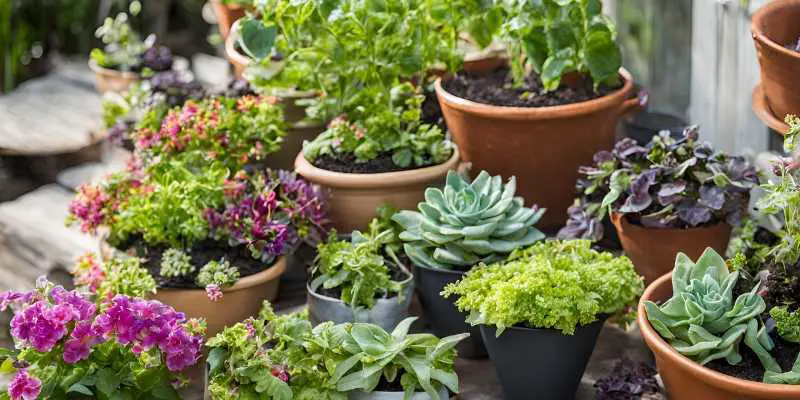Mulching your garden at the right time is crucial. It helps your plants thrive.
But when is the best time to mulch your garden? Timing your mulching efforts can make a significant difference. Mulch acts as a protective layer. It retains soil moisture, reduces weeds, and improves soil health. Knowing the optimal time to mulch ensures your garden gets the maximum benefits.
Spring and fall are popular times for mulching. Each season offers unique advantages. Spring mulching prepares your garden for the growing season. Fall mulching helps protect plants during winter. Understanding when to mulch can lead to a healthier, more vibrant garden. Let’s explore the best times to mulch and the reasons behind them.

Credit: www.reddit.com
Best Seasons For Mulching
Spring is a great time to mulch. The soil is warming up. New plants are growing. Mulch helps keep the soil moist. It also stops weeds from growing. Use organic mulch like wood chips. It breaks down and adds nutrients to the soil. Spread mulch 2-3 inches thick around plants. Keep it away from stems and trunks.
Fall mulching protects plants from cold. It keeps the soil warm. This helps plant roots stay healthy. Use straw or leaves for fall mulch. Spread it thicker than in spring. 4-6 inches is good. This layer will break down over winter. It will feed the soil for spring.

Credit: joegardener.com
Benefits Of Seasonal Mulching
Mulching can help control weeds. Mulch blocks sunlight from the soil. Weeds need light to grow. This means fewer weeds in your garden. Less work for you.
Mulch helps retain soil moisture. Water stays longer in the soil. Plants do not dry out quickly. This helps plants grow better. You water less often.
Choosing The Right Mulch
Organic mulches improve soil health. They include wood chips, leaves, and straw. These materials decompose over time. They add nutrients to the soil. They also help to retain moisture. Mulches like bark and compost are common. These options also help to reduce weeds.
Inorganic mulches do not decompose. They last longer than organic ones. Examples include gravel, stones, and plastic sheets. These materials are good for pathways and flower beds. They help control weeds. Inorganic mulches also keep the soil cool. They are best for decorative purposes.
Preparing Your Garden
Good soil helps plants grow. First, loosen the soil with a shovel. This helps roots get air and water. Add compost for rich nutrients. Mix it well with the soil. Test the soil’s pH with a kit. This helps you know what the soil needs.
Weeds take nutrients from your plants. Remove them before planting. Pull weeds by hand or use a small tool. Make sure to get the roots out. This stops them from growing back. Add a layer of mulch to stop new weeds. Mulch keeps the soil moist and cool.
Mulching Techniques
Mulching your garden in early spring helps retain moisture and control weeds. Fall mulching protects roots during winter. Choose the time based on your garden’s needs.
Layering Mulch
Start by removing weeds from the soil. Spread mulch evenly over the soil surface. Layer mulch about 2-3 inches thick. This helps keep moisture in the soil. It also stops more weeds from growing. Too much mulch can harm plants. Check mulch often to ensure it’s not too thick.
Mulching Around Plants
Keep mulch away from plant stems. Mulch touching stems can cause rot. Leave a small gap around each plant. This helps air reach the stems. Spread mulch in a circle around each plant. This keeps soil warm and moist. Reapply mulch each year for best results.
Common Mulching Mistakes
Spring and fall are the best times to mulch your garden. Avoid piling mulch too high around plants. This can cause rot and pests.
Over-mulching
Putting too much mulch can hurt plants. It can stop water from reaching roots. Thick mulch can also hold too much moisture. This can cause root rot. Keep mulch about 2-3 inches deep. Make sure to leave space around plant stems. This allows air to reach the roots.
Improper Timing
Mulching too early or too late can be harmful. Spring is the best time for mulching. This helps keep the soil warm. Mulching in fall can keep plants warm for winter. Avoid mulching in summer. It can trap too much heat. Always check the weather before mulching. This helps avoid extreme conditions.
Expert Tips For Effective Mulching
Mulch helps keep soil moist and weeds away. Spread mulch evenly for best results. Use organic mulch for added nutrients. A layer of 2-3 inches works best. Too much mulch can harm plants.
Do:
- Use mulch to prevent weeds.
- Apply mulch in spring and fall.
- Keep mulch away from plant stems.
- Replace old mulch yearly.
Don’t:
- Use plastic mulch for long periods.
- Apply mulch too thickly.
- Ignore signs of mold in mulch.
- Forget to water before mulching.

Credit: www.reddit.com
Maintaining Mulch Throughout The Year
Check your mulch every few months. Look for any weeds growing through the mulch. Remove them quickly. Notice if the mulch has decomposed or thinned out. Add more mulch if needed. This keeps your garden healthy and neat.
Replenish your mulch once or twice a year. Spring and fall are the best times. Spread the new mulch evenly. Keep a 2-3 inch layer. Too thick can harm plants. Avoid piling mulch against plant stems. It can cause rot. Follow these steps to keep your garden fresh.
Frequently Asked Questions
What Is The Best Season To Mulch My Garden?
The best season to mulch your garden is early spring. This helps to conserve moisture and suppress weeds. Fall is also a good time to mulch, as it protects the soil over winter.
How Often Should I Mulch My Garden?
Mulch your garden once a year. Ideally, do it in early spring. Check the mulch layer periodically and add more if it decomposes.
Can I Mulch My Garden In Summer?
Yes, you can mulch in summer. It helps retain soil moisture and keeps roots cool. Ensure a 2-3 inch layer for effectiveness.
What Type Of Mulch Is Best For Gardens?
Organic mulches like wood chips, straw, and compost are best. They improve soil fertility as they decompose. Inorganic mulches like gravel are also effective but don’t enhance soil health.
Conclusion
Mulching your garden at the right time is crucial. Spring and fall are ideal seasons. Spring mulch protects and nourishes new growth. Fall mulch insulates plants during winter. Timing depends on your climate and plants. Always avoid mulching in extreme weather.
Consistent mulching results in healthier, more vibrant gardens. Remember, proper timing and technique matter. Happy gardening!

My mission is to help you bring the beauty of nature indoors with expert advice, detailed plant care guides, and creative design ideas.





Leave a Reply